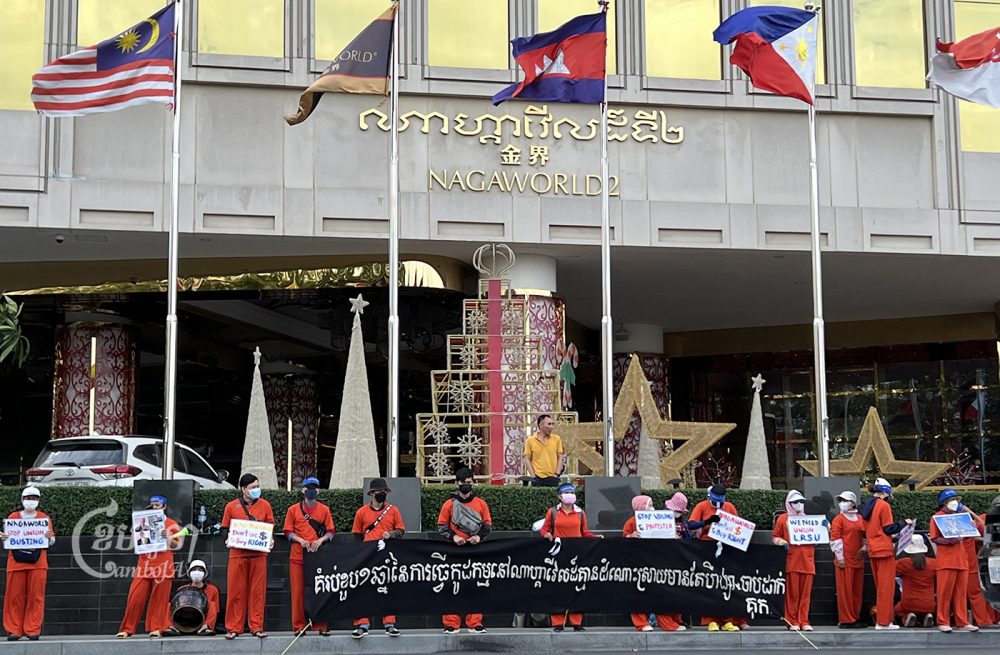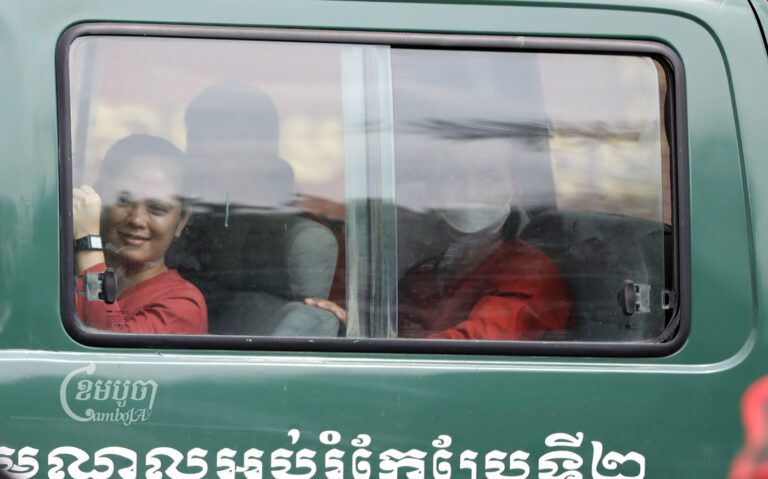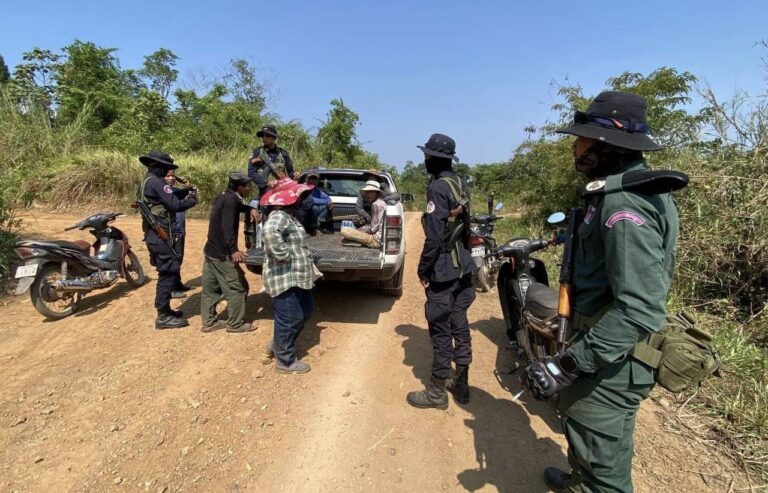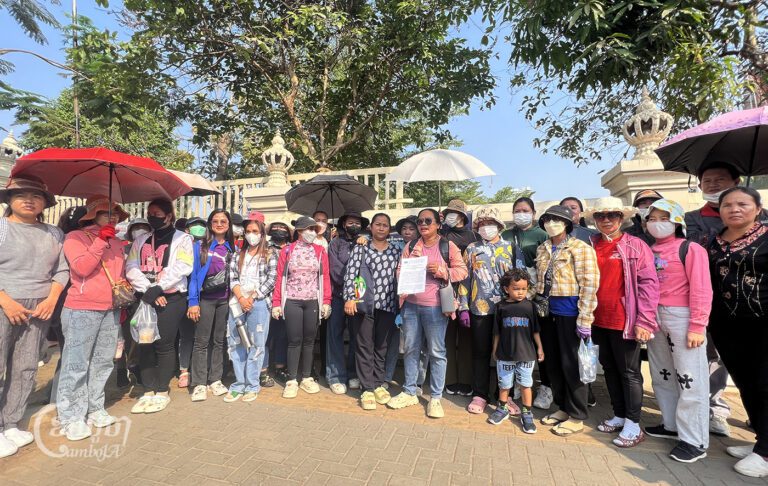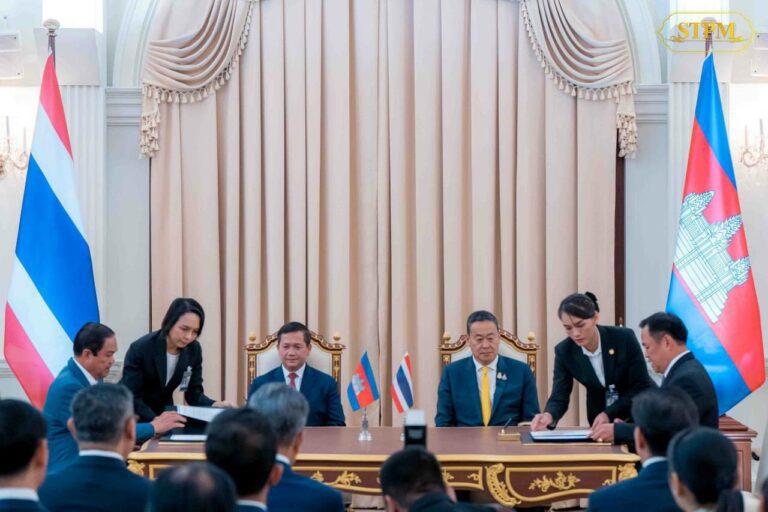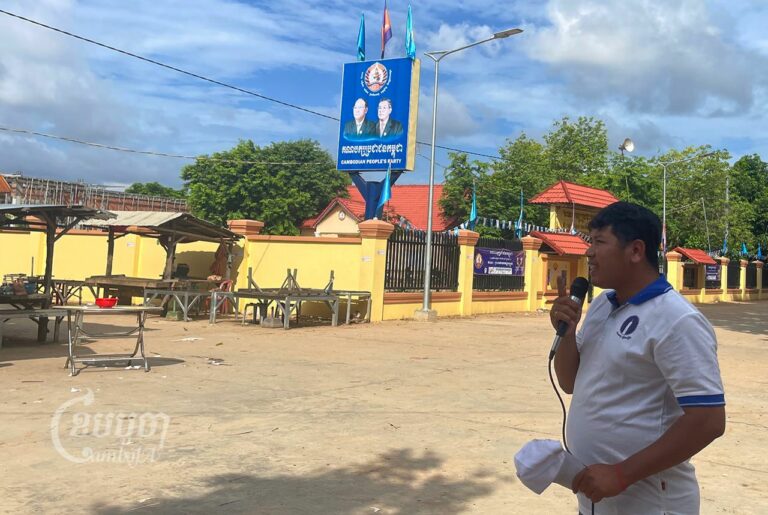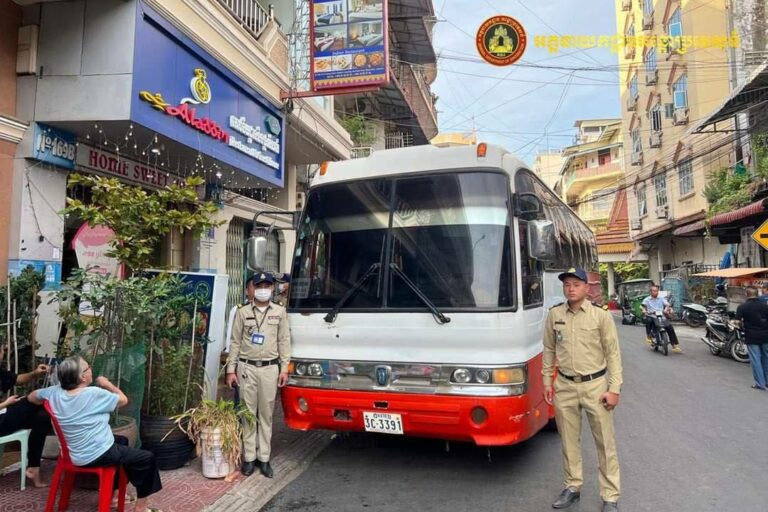Enduring assaults, arrests and financial hardship for months, NagaWorld employees marked the one year anniversary of Cambodia’s longest running strike by gathering on Sunday outside Phnom Penh’s exclusive casino.
Dozens wore orange jumpsuits to symbolize the renewed incarceration of NagaWorld union leader Chhim Sithar, as human rights groups called for her release.
“For more than a year, I have suffered a lot and felt injustice from the authorities and the company’s security team,” said Bean Run David, who worked at NagaWorld casino for three years. “Authorities have used violence against the strikers many times.”
Although the NagaWorld strike amassed hundreds of employees when it first began on December 18 last year, today only around 120 hardened strikers have refused to accept NagaWorld’s compensation offer, according to the union. They persist in demanding proper severance compensation and the reinstatement of union members fired in April 2021.
“We will continue to protest until there is a legal solution, not take the [company’s] money and walk away,” David said.
Eliminating an independent union
While NagaCorp, the owner of NagaWorld, claimed the economic downturn of Covid-19 required them to fire 1,300 employees, including all the casino’s union leadership, rights groups like the Center for Alliance of Labor and Human Rights (Central) and Human Rights Watch say the layoffs were part of a targeted attempt to squash NagaWorld’s independent union.
Union member Phan Channa, 30, who worked as a slot machine manager for seven years and echoed many of her colleagues in saying she believed the company discriminated against the Labor Rights Supported Union of Khmer Employees of NagaWorld, as it is formally known.
“The company wants to destroy our independent union that always protected workers when they faced the problem, so they don’t want an independent union in their company because it affects their interests,” Channa said.
Following 21 meetings in the past year, the company and strikers have not come to an agreement, according to a statement issued by the Ministry of Labor and Vocational Training on November 25.
NagaWorld union members say the government has sided with the company and actively suppressed what they say is their legal right to strike. The workers already appealed to Cambodia’s Arbitration Council, which issued a non-binding ruling ordering the casino to recalculate worker severance. The company had calculated severance pay based on employees reduced work hours and salaries during the height of the pandemic.
The ruling to recalculate the severance payment was not enforced by the Ministry of Labor, which has demanded workers accept the company’s original offer. Many workers eventually did accept the payment, citing financial hardship.
Strikers say that the Ministry of Labor and Vocational Training has not acted as a transparent arbitrator but has been supporting the company’s interests since the beginning.
Ministry of Labor spokesperson Heng Sour did not respond to requests for comment.
Katta Orn, spokesperson for the governmental organization Cambodian Human Rights Committee (CHRC), claimed the union is at fault for not accepting the company’s terms, even after the Arbitration Council found NagaWorld’s compensation in violation of Cambodian labor law.
“I do not know who can solve this problem besides them [the union] accepting the solution,” Orn said. The leaders of the strike, he claimed, “have their own goals and do not want this conflict to end.”
Union member Mam Sovathen, who still participates in the strike, said she and her colleagues have been under pressure from the judiciary to abandon the strike.
Phnom Penh municipal authorities declared the strike illegal soon after it commenced and arrested dozens of strikers within weeks.
“We see that the state is not on the side of the workers and does not support the strikers, we see that the [authorities] are biased towards the company,” Sovathen said, citing tactics such as the closure of public restrooms near the strike site.
Ongoing lawsuits and detention
Currently 15 labor leaders and activists, including union leader Sithar, face charges of instigating civil unrest, though they were released on bail in March. Dozens have been arrested since the strike began. In October, nine union members were sued by the company for allegedly causing property damage, breaking and entering and unlawful confinement.
Sithar was first arrested on January 4th, when plain-clothed police officers violently her as she arrived at the strike site, then outside the Australian embassy. She spent 74 days in jail on what Human Rights Watch described as “fabricated charges.”
“What I remember most is the picture of the authorities arresting Chhim Sithar angrily, the way tigers catch a small rabbit,” said union member Sovath.
Last week, Human Rights Watch and Amnesty International urged Cambodian authorities to release Chhim Sithar, who was arrested again in November after returning from a trip abroad while out on bail.
CHRC spokesperson Orn claimed NGOs calling for the release of Sithar were interfering in the affairs of Cambodia’s judiciary. He claimed Sithar had violated her court ban on leaving the country when she flew to Australia.
“When individuals exercising their rights and freedoms of expression violate the law, it becomes a crime and they will face the law,” he said. “Some civil society organizations want to protect the person but the person acted illegally,” he added, referring to Sithar.
Authorities and government-aligned media have claimed the NagaWorld union is aligned with foreign powers attempting to subvert the Cambodian government through a so-called color revolution, citing training of union members from international civil society groups like the East-West Management Institute as evidence in court appearances.
Another NagaWorld union member, Seak Panha, a defendant in the company’s lawsuit, said she was questioned a second time in court on December 13.
“The investigating judge just asked me repeatedly who is behind the strike and asked if I detained people or not,” Panha said.
Violence, sexual harassment and economic hardship
As the strike progressed, many strikers say they have struggled to support their families and suffered from psychological pressure and sexual harassment by authorities.
NagaWorld housekeeper Som Sopha, 48, said that she has been working with NagaWorld since its earliest days as a casino on a cruise ship.
“When the company fired me in May, I was frustrated and wondered why the company didn’t give value due to the fact that I worked there for 26 years,” she said, tearing up.
She has since been unable to find another job to support her family due to her age, and her family of four has relied on her husband’s salary of $120 to pay their rent of $80, support her children’s studies and put food on the table.
“Sometimes I limit the food we eat,” she said. “We used to eat delicious food but now we can only cook once and eat for two days.”
Another striker, union member Sok Rathana, said she suffered a miscarriage in May due to rough handling by authorities as they rounded up strikers onto a bus to remove them from the strike site.
“I lost my unborn child because the authority hit another striker and then pushed me down on the bus,” she said.
Doctors warned her she could not have children in the future, she said. “My uterus is thin and weak, meaning that if I plan to have more children, I may face a miscarriage again,” she explained.
Fellow union member Sin Sreynich said authorities punched her in the nose, an incident documented in an August 11 Licadho report.
Her colleague Dam Youen, a 36-year-old card dealer, said strikers have faced sexual harassment from authorities.
“Sometimes the authorities try to touch the female strikers’ breasts and genitals,” she said.
“The authorities plucked my hair and kicked me like an animal, the scars are still on my body,” she added. “Those pictures are still deep in my mind, I can’t forget the pain because the authorities should come to protect us, not use their power for violence.“
CHRC spokesperson Orn, a government official, said strikers could file a complaint to the police.
But Orn claimed Rathana’s miscarriage and allegations of authorities’ violence against strikers were fabrications and no charges should be filed by police without clearer evidence.
“We can not assume whether the miscarriage was caused by the authorities, only a doctor and expert can tell about miscarriage,” he said. “There was no investigation, no complaint…we can not accuse each other.”

How will it end?
Some union members and labor activists say they believe only Prime Minister Hun Sen can end the dispute because the judicial system, the Ministry of Labor and the company appear unwilling to engage with the strikers in good faith.
“I don’t place much hope in the court system to find justice for us, but the only hope I have been waiting for is Prime Minister Hun Sen,” union member Sovathen said. “I really want him to find justice for us but don’t know how to tell him.”
Khun Tharo, program manager for labor rights group CENTRAL, told CamboJA in June that civil society organizations had unsuccessfully petitioned the National Assembly to intervene.
“I believe only the prime minister has the power to terminate this labor issue because the Minister of Labor has no influence,” Tharo said.
Government spokesperson Phay Siphan said the strikers’ calls for the Prime Minister to find a solution was “impossible” and existing government labor laws would suffice.
“As for the prime minister, he always adheres to the principles and mechanisms that the government has established,” he said. “And if the solution is to wait for the prime minister, I think it is inappropriate.”
Am Sam Ath, operations director of human rights group Licadho, said the oppressive and antagonistic response by authorities against the strikers has undermined the credibility of the institutions intended to solve labor disputes.
“It is a response that makes the strikers continue to strike and lose faith in the ministries and institutions that have resolved [these issues] in the past.”


